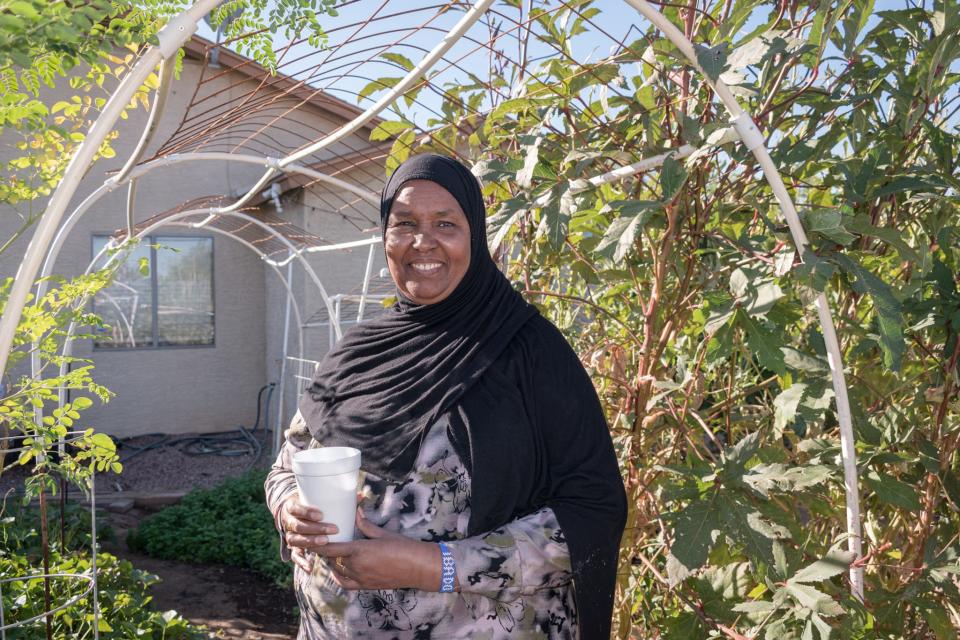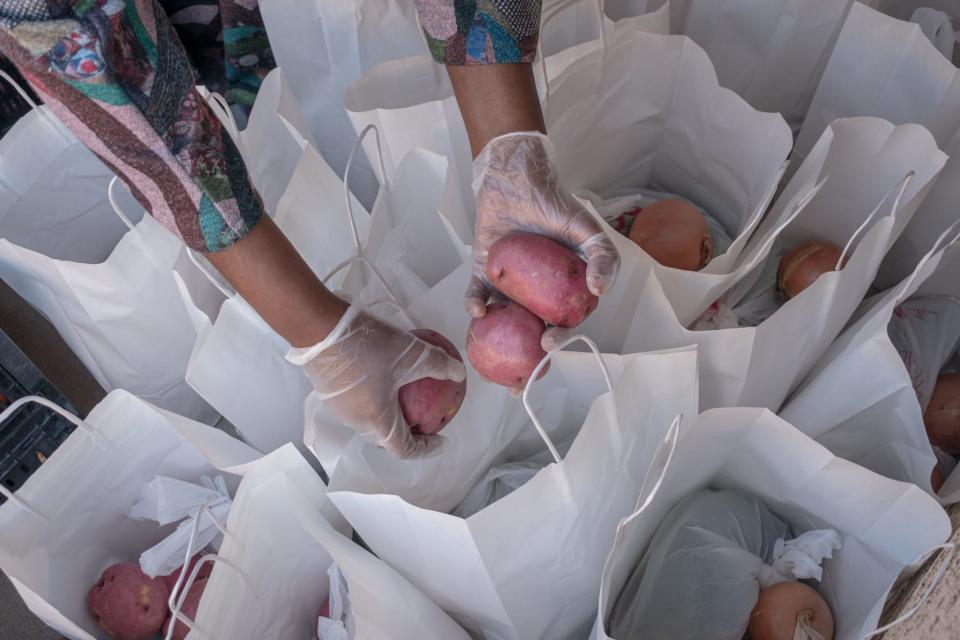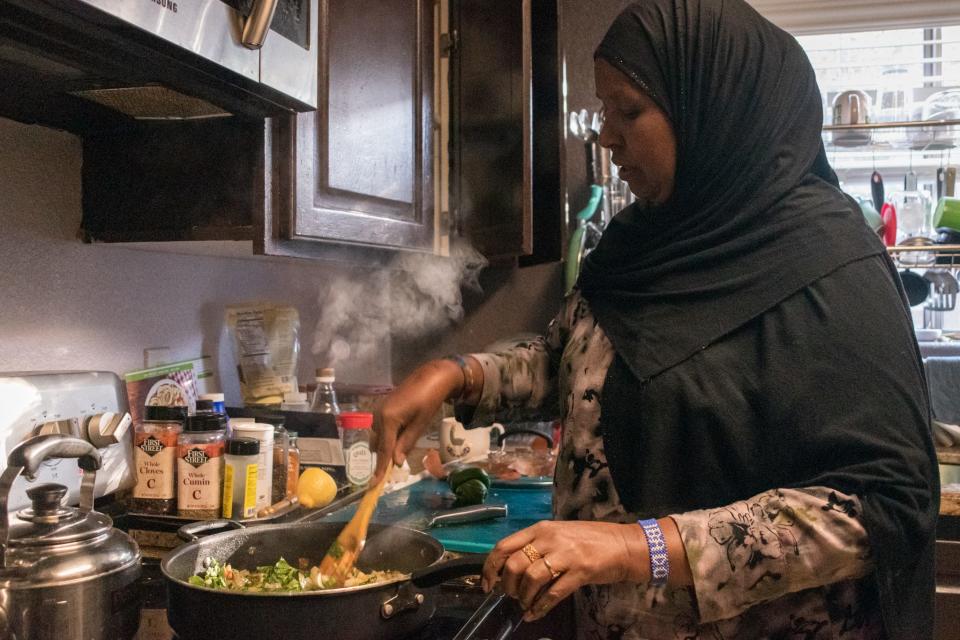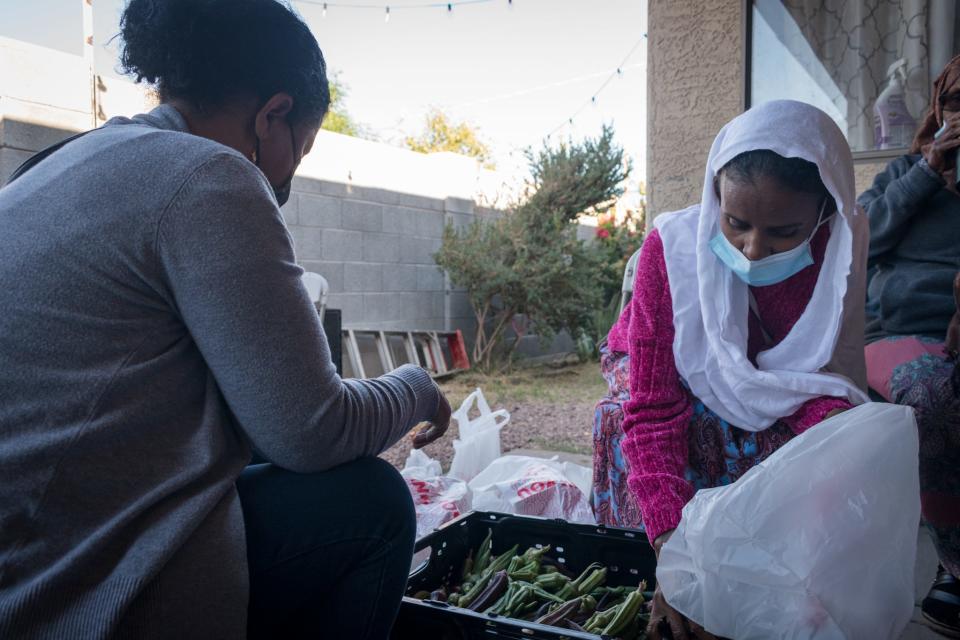'We want to empower Black people': How this Somali refugee is feeding Phoenix families
A group of people, mostly women, gathered on Ibado Mahmud's back patio around a wagon overflowing with tangled vines of sweet potato greens. Mahmud’s friend Khadija Farah wore bright red, oversized gardening gloves that stood out against her light gray garbasaar, a shawl worn by Somali women.
She pulled out a particularly leafy vine and declared, “That’s a beautiful one.”
Near the wagon sat a crate of freshly harvested eggplants, both the long, slender Japanese variety and the squatter, more common kind. Kevin Peart used a wheelbarrow to roll in more crates of food from other farms: fat yellow lemons and vivid oranges, burgundy potatoes lightly mottled with dirt, yellow onions and bags of spinach leaves.
On this sunny and brisk autumn morning, they’ll divide this rainbow of fruits, vegetables and roots into paper sacks and deliver them to families around the Valley.
Mahmud, one of the founders of Drinking Gourd Farms, has a homestead farm in her backyard in Phoenix, and every Saturday she and other volunteers meet up to harvest and distribute food. For her, this is what it looks like to reclaim a part of the food system.
“We harvest and we give to the community,” Mahmud said. “We do not sell them. We do not do for making money. We do this to give our community healthy food.”
How did Drinking Gourd Farms begin?

In March 2020, Mahmud was one of hundreds of concession workers at Phoenix Sky Harbor airport who were furloughed during the pandemic when air travel dropped off.
Mahmud said she had become an active part of the African American community through her involvement with the airport hospitality workers union, UNITE Here, as well as local refugee services. She had worked at the airport for nearly 20 years, she said.
Nationwide, the coronavirus pandemic hit Black households disproportionately harder than white households, even with pre-pandemic, socioeconomic disparities taken into account, according to the U.S. Census Bureau. In the first year of the pandemic, Black Americans also died from COVID-19 at a higher rate than white Americans, The Atlantic reported.
Personally, Mahmud knew many people who had lost their jobs. People were sick or elderly and couldn’t go out to shop during the pandemic. She envisioned a way to not only get food to people, but to provide seasonal and organic produce grown by the community for the community.
That vision became a reality after she met Chapman, a local activist, through her son, a union organizer. He helped connect her to resources, such as farming workshops, and they passed their knowledge on to other farmers in Phoenix, many of them African refugees like herself.
In November 2019, Mahmud and Chapman launched Drinking Gourd Farms, a network of Black and African American homestead farmers in metro Phoenix. A homestead farm refers to a plot of land, typically smaller than a commercial farm, where farmers live and grow food to provide for their family.
Drinking Gourd is made up mostly of African Muslim women who came to the United States as refugees. The name is a reference to the hollowed gourds American slaves drank from, as well as another name for the Big Dipper — the constellation that fugitive slaves followed to escape north to freedom.
By 2020, there were more than 20 active homestead farms and Mahmud’s group of volunteers were delivering close to 200 sacks of produce to families around Phoenix each week. The group primarily serves Black and African American families as those households have been disproportionately impacted by food insecurity, but Drinking Gourd Farms will help anyone who asks, said Mahmud's daughter, Nemo Kahsai.
New traditions: Clam digging in Arizona runs deep for Cambodian families
The need was so great during the pandemic that they received additional food donations from Golo Family Farm Organic Farms, a commercial farm in Waddell run by a Liberian refugee couple.
Mahmud estimated that Drinking Gourd Farms typically has about eight to 11 active homesteads at any given time, including her own.
“This is where it all started,” said Ken Chapman, a volunteer who had arrived earlier that morning to cut the sweet potato vines.
Sweet potato greens aren’t usually found at the grocery store. The leaves taste a little bitter when eaten raw, he said — but not after they’re cooked, Farah chimed in.
"Most people aren’t actually connected to what we eat,” Chapman said. “We don’t know where it comes from, we don’t know what it looks like, and then we don’t understand seasons either. When you go to the store and you can buy a watermelon in January, you don’t understand that oh, watermelon is actually a summertime fruit.”

Homestead farming brings refugee families together
After they finished divvying up fruits and vegetables into grocery bags, Mahmud and Ismahan Musse came out of the house with a breakfast of scrambled eggs with diced bell peppers, sweet potato greens, tomatoes, zucchini, eggplant, onion — almost all picked from Mahmud's backyard. The food was served with crusty bolillo bread and Mahmud's crowd-pleasing shaah, a Somali tea spiced with cardamom, cloves and cinnamon.
Mahmud's husband topped his eggs with thinly sliced peppers for added heat, remarking that the peppers are hardly spicy. "Never trust an Ethiopian when he says it's not that spicy," Chapman warned.
The sound of friendly chatter was backed by a Somali song with an upbeat synth melody — "Isii Nafta" by Nimco Happy, a song that went viral on TikTok, someone was excited to mention.
Farah circled the group, offering a handful of okra. She bit into one with a satisfying crunch. "She's the queen of raw food," Kahsai said with a laugh, referring to Farah affectionately as her auntie.
Farah, one of the homestead farmers, started with a patch of dirt in her backyard, which was mostly paved over. With a few squash seeds she turned it into what she describes as her "jungle corner." She has since set up raised bed planters.

Kahsai described how her own family had grown herbs out of buckets until a few years ago when her mother took an interest in growing her own food.
There were a lot of failures. They didn’t know what grew in which season, Mahmud said. They weren’t aware of local pests, such as squash beetles, or that the soil in their backyard needed additional nutrients from compost and natural fertilizer.
“I grew up where everything is natural and you don’t need fertilizer. You just put it in the ground and give water and then it comes out,” Mahmud said.
Mahmud grew up near the southern coast of Somalia, a predominantly Muslim country on the Horn of Africa. In December 1990, during the onset of the Somali Civil War, Mahmud, her husband and their three children moved to a refugee camp in bordering Kenya.
Kahsai recalled switching between four different languages when she lived there as a child: Somali; Tigrinya, her Ethiopian father’s native tongue; Swahili, the most commonly spoken language in Kenya; and Oromo, another language spoken primarily in Ethiopia and northeastern Kenya.
Southwest Black Ranchers: An Arizona couple makes their dream ranch a reality
The family moved to Phoenix in 1993 with the help of an organization now known as the International Rescue Committee.
“When we first come here, I was very, very lonely,” Mahmud said. “Does not know what to do. Do not speak English. Have three small children, just me and my husband… Most of the food they bring to me I threw away because I didn’t know what it was. Is it pork, not pork? I don’t know. Alcohol, no alcohol?”
Mahmud said she was fortunate enough to meet a neighbor who, despite the language barrier, helped them navigate their early days in Phoenix.
Now she wants to help new African refugee families in Phoenix know they’re not alone. Drinking Gourd Farms is one way to reach people, whether it’s showing families how to cook vegetables they’re not familiar with or teaching them how to start their own garden.
How farmers joined the movement for Black liberation
Food sharing and community education is only the beginning, she said. Her real dream is to purchase land for a bigger farm and invite formerly incarcerated people to grow food. One of her own sons has struggled with misdiagnosed and mistreated mental illness, which led him in and out of prison. She’s seen how difficult it is for him to find a job, she explained.

Life inside prison is structured around a daily schedule, from set meal times to roll calls, Kahsai said. It can be hard for people to adjust to the freedoms of life outside prison, especially when they face hurdles such as finding work, housing and transportation. This makes people vulnerable to landing in prison again, she said.
This cycle makes it challenging for people, especially young Black men, to establish themselves in society, Kahsai said. Black Americans are incarcerated in state prisons across the country at nearly five times the rate of white Americans, according to a report by The Sentencing Project.
Drinking Gourd Farms could be a way for formerly incarcerated people to make that transition, Mahmud said. Growing can be meditative because, in the process of growing food, you are also growing your mind, she said.
The Freedom Food Alliance, started in New York, and Tiger Mountain Foundation in south Phoenix, work closely with formerly incarcerated people and other organizations are incorporating food justice.
Growing food to nourish each other is a form of liberation, Kahsai added.
It's a concept that forms the basis of the book Farming While Black: Soul Fire Farm's Practical Guide to Liberation on the Land, written by prominent Black Kreyol farmer Leah Penniman. The book shares insights into starting a farm business, but also looks at farming as a way of healing from trauma and building a movement for justice.
Black farmers played a central role in the civil rights movement by coordinating desegregation campaigns, as well as providing food and safe havens for activists and displaced tenant farmers, Penniman writes.
"There is a history of oppression of Black people in the U.S.," Kahsai said. "Access is a form of oppression for Black people — what neighborhoods have what grocery stores, the prices determining what food they buy and where. We want to empower Black people and refugees to grow our own food so we can free ourselves."
Details: Drinking Gourd Farms, drinkinggourdfarms.org. To get involved, contact Nemo Kahsai at instagram.com/drinking_gourd_farms or nemo@drinkinggourdfarms.org.
Back to the land: How this chef is sharing his Navajo food culture
Reach the reporter at Priscilla.Totiya@azcentral.com. Follow @priscillatotiya on Twitter and Instagram.
Subscribe to azcentral.com today to support local journalism.
This article originally appeared on Arizona Republic: Drinking Gourd Farms: These refugee homesteaders grow food and justice

